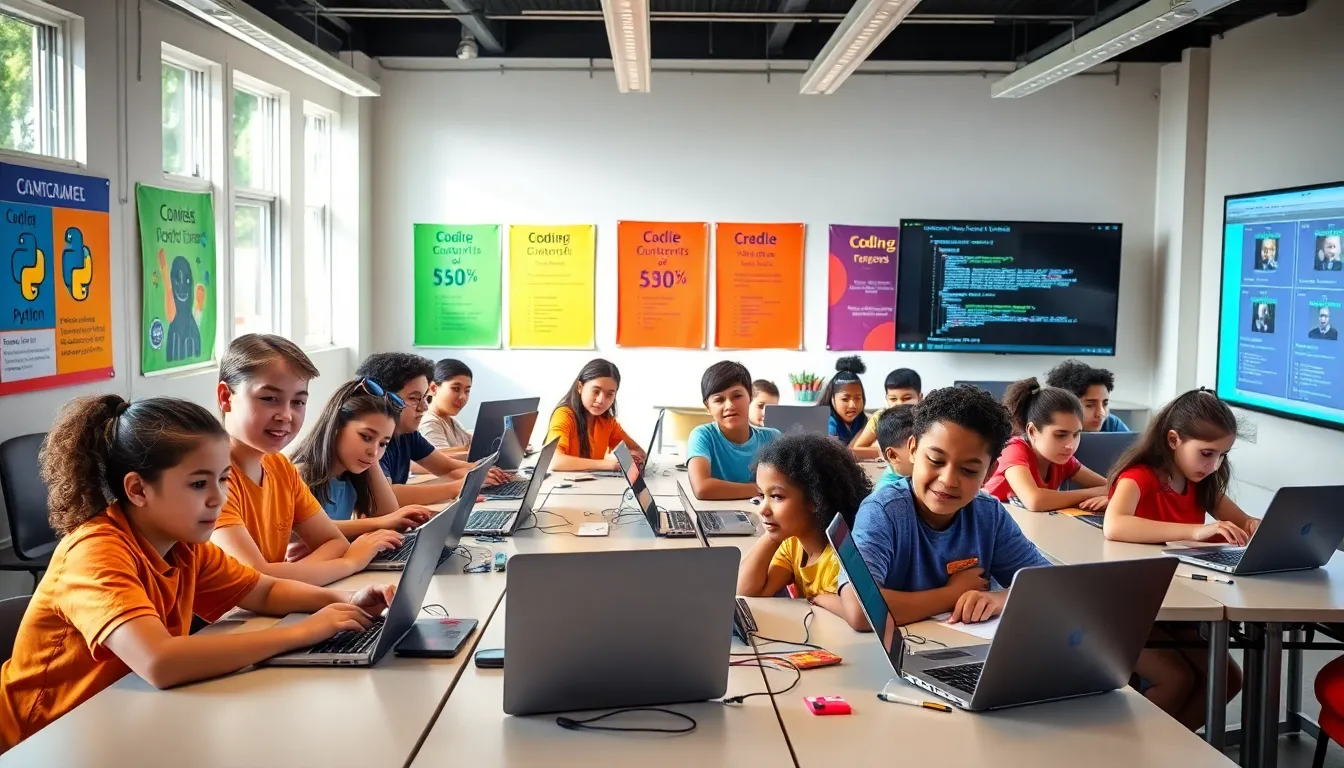Summer is not just for lounging by the pool, sipping lemonade. It’s a golden opportunity to unleash creativity and innovation, especially when it comes to tech. Welcome to the world of summer coding camps. These camps are not just a way to keep kids busy: they’re a chance to jump into the digital future and create, innovate, and learn. Imagine your child walking away not just with some fun stories, but also skills that could potentially land them a job in Silicon Valley years down the line. If that sounds intriguing, read on.
Table of Contents
ToggleWhat Is a Summer Coding Camp?

A summer coding camp is an immersive program designed for students eager to learn programming, game development, web design, or app creation. These camps typically take place during the summer months, offering a structured yet fun environment where kids and teens can dive deep into technology. Most camps are geared toward different age ranges, catering to newcomers and seasoned coders alike. They’re more than just classes: they blend education and fun through hands-on projects, collaborative challenges, and sometimes, even hackathons. Often, students can explore languages like Python, Java, or C++, based on the camp’s focus. In essence, a coding camp is like a tech playground, where young minds can experiment, create, and connect with peers who share their passion for technology.
Benefits of Attending a Summer Coding Camp
The benefits of attending a summer coding camp are as plentiful as the summer sun. First and foremost, students develop critical problem-solving skills. Coding teaches logical thinking, and when they encounter challenges, they learn to analyze and strategize solutions. Besides, these camps are fantastic for enhancing creativity. Participants engage in projects that encourage them to think outside the box, fostering their inventive spirits.
Social interaction is another key advantage. Camps provide a nurturing environment where friendships blossom. Working in teams teaches collaboration and communication, skills that are invaluable in any future career.
Finally, students often end the camp with tangible projects to showcase. Whether it’s a game, a website, or a simple app, having a product they can present adds a dash of pride to their summer adventure.
Choosing the Right Summer Coding Camp
Choosing the right summer coding camp can feel overwhelming with all the options available. Start by assessing your child’s interests. Some camps focus on game development, while others may emphasize web design or robotics. Aligning the camp’s focus with what excites your child will ensure maximum engagement.
Next, consider the level of instruction. Does the camp offer programs for beginners? Are there options for advanced students? Reading reviews can provide insight into the quality of teaching. Try to reach out to alumni: their experiences can offer valuable perspectives.
Finally, don’t overlook practical considerations. Think about the camp’s location, duration, cost, and time of day. Is it a day camp or residential? Ensure it fits into your family’s schedule and budget.
Curriculum and Activities in Coding Camps
Curriculum and activities at summer coding camps are designed to engage students and keep them excited about learning. Typically, camps will start with foundational principles, allowing everyone to grasp the basics before tackling more complex projects. Along the way, participants might learn different coding languages, algorithms, and software development methodologies.
Hands-on projects are crucial. Students may work individually or in teams to develop games, apps, or websites, allowing them to apply what they’ve learned effectively. Alongside this, many camps incorporate fun activities such as coding challenges and hackathons, making learning a competitive yet enjoyable experience.
Also, guest speakers and industry professionals often share insights into real-world applications of coding. Such exposure can inspire students and show them the many paths a coding career can take.
How to Prepare for Summer Coding Camp
Preparation for a summer coding camp doesn’t have to be daunting. Start by gathering the necessary materials. Many camps provide a list of required tools or software. Ensure your child has access to a laptop, one that can run the software needed for their specific coding projects.
Creating an open mindset is also key. Encourage your child to approach the camp with curiosity. Remind them that it’s perfectly acceptable to not know everything: the goal is to learn and have fun. Also, brushing up on foundational knowledge ahead of time can help. There are countless online resources and tutorials available for those who want to get a jump start.
Finally, packing appropriate gear is vital. Sunscreen, a water bottle, and snacks can ensure students stay energized and focused throughout the day, particularly in longer camps.
Success Stories from Summer Coding Camp Alumni
Success stories from summer coding camp alumni highlight the transformative impact these programs can have. Take, for instance, Emily, who attended a game development camp and went on to create a popular mobile game that garnered thousands of downloads. Her experience at camp ignited a passion that has led her to pursue a degree in computer science.
Similarly, Jake’s journey started with a simple web design project at camp. Now a successful freelance developer, he credits his camp experience for laying the foundation of his skills.
These stories demonstrate that summer coding camps are not just about immediate learning, they can ignite a lifelong passion for technology. They serve as a launchpad for future careers and ventures, eventually shaping the future innovators of our world.






